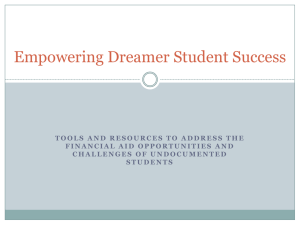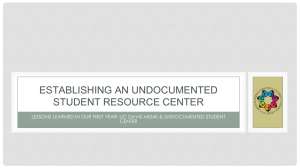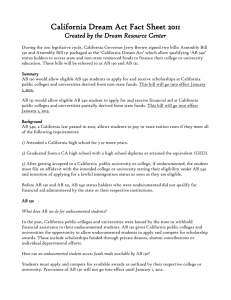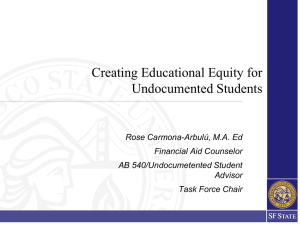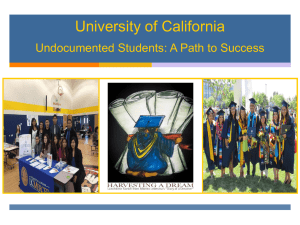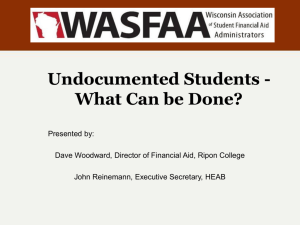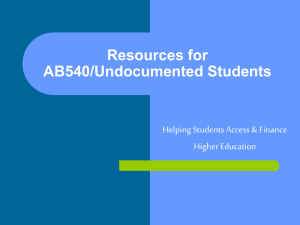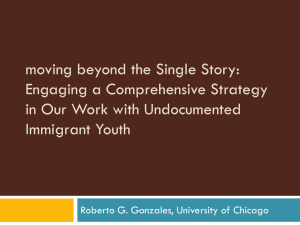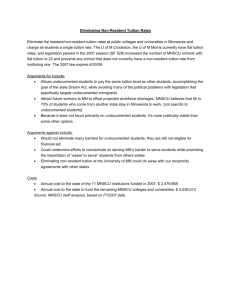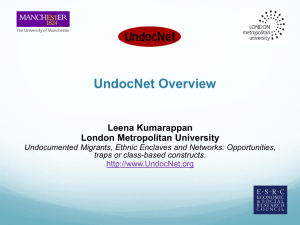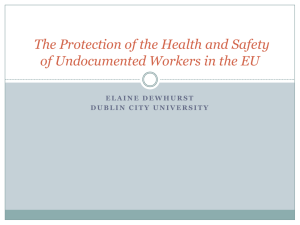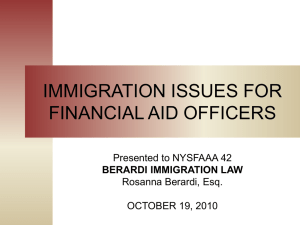Myths and Misconceptions about Undocumented
advertisement
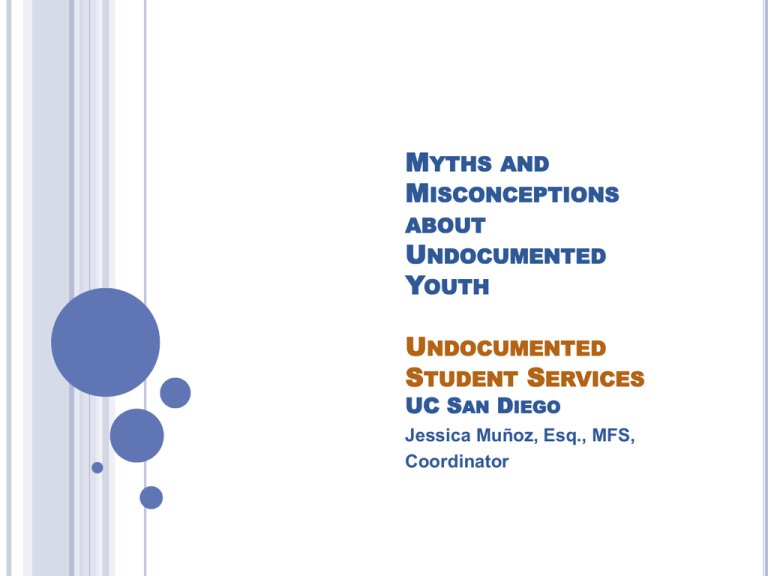
MYTHS AND MISCONCEPTIONS ABOUT UNDOCUMENTED YOUTH UNDOCUMENTED STUDENT SERVICES UC SAN DIEGO Jessica Muñoz, Esq., MFS, Coordinator WHO ARE UNDOCUMENTED YOUTH? Youth who are undocumented do not have immigration status. Youth who are undocumented come from diverse backgrounds and countries of origin. Some youth, youth from mixed immigration status families, who are not undocumented have important families members who are undocumented. MYTHS AND MISCONCEPTIONS Sorting reality from perception MYTH 1: STATE AND FEDERAL PROGRAMS DESIGNED TO SUPPORT YOUTH HAVE SIMILAR REQUIREMENTS State programs, such as AB540 and California Dream Act, have different requirements than federal programs, such as DACA. A student may meet the requirements for one, some, all or none of the state and federal programs that create opportunities for undocumented youth WHAT’S THE DIFFERENCE BETWEEN AB540 AND DACA? AB540 Calif. state law College student-specific legislation Does NOT defer deportation Does not provide SSN or work authorization DACA Presidential executive order Not college studentspecific Defers deportation Means to SSN and work authorization FEDERAL DREAM ACT Has NOT been passed and is NOT a federal law DREAM is an acronym for Development, Relief and Education for Alien Minors There are multiple versions The centerpiece of federal DREAM Act legislation is a path to legal permanency for undocumented young people who entered the U.S. as children and have pursued a college education and/or military service MYTH 2: NEW LAWS HAVE FIXED THE PROBLEMS Deferred Action for Childhood Arrivals (DACA) and Deferred Action for Parents of Americans and Lawful Permanent Residents (DAPA) Are not laws Would be easy to change/reverse Are not pathways to legal permanency Do not/Will not apply to everyone MYTH 3: ALL/MOST UNDOCUMENTED AS LATINO/A. YOUTH IDENTIFY Nationally, the majority of youth who have requested and been approved for DACA do come from Mexico, El Salvador, Honduras, and Guatemala. Countries that are ranked in the top 23 “countries of birth” for DACA recipients also include Korea Philippines India Jamaica Pakistan Poland COUNTRY OF ORIGIN: DACA APPLICANTS VS. UC SAN DIEGO STUDENTS DACA Applicants (Country of Birth) 1. 2. 3. 4. 5. Mexico (76%) El Salvador (4%) Honduras (3%) Guatemala (3%) Korea (1%) Source: Based on publically available statistics from the United States Customs and Immigration Services, Characteristics of Individuals Requesting and Approved for Deferred Action for Childhood Arrivals (DACA), August 2012-September 2013. Available online at www.uscis.gov UCSD Students (Country of Emigration) 1. 2. 3. 4. Mexico (38%) Korea (37%) Canada (3%) Philippines (3%) Note: All other countries were 2% or less Source: UC San Diego Winter 2014 Need Assessment of Undocumented Students. All information was self-reported. MYTH 4 UNDOCUMENTED YOUTH AND THEIR FAMILIES CAN’T/DON’T PAY TAXES Youth with DACA receive an SSN Undocumented individuals without an SSN can use an ITIN for filing income taxes Recent estimates suggest that in California alone, taxpayers who are undocumented contribute over 2 billion dollars in state and local taxes* *Undocumented Immigrants State and Local Tax Contributions, Institute on Taxation and Economic Policy, July 2013. Available online at http://www.itep.org/immigration/#map. DISCUSSION TIME How does the perpetuation of these (or other myths) affect students’ experiences in the classroom, on campus, and beyond? AFFECTS OF MYTHS ON STUDENTS Students may be given misinformation Students may not seek information based on fears related to stereotypes Students may not receive proper recommendations when trying to make decisions and/or may not understand consequences of choices. NOW WHAT? What is available for students? How can I help? WHY ARE SERVICES NEEDED? Students who are undocumented face unique obstacles while pursuing their higher education goals. For example: Economic barriers Legal concerns (self and family) Travel restrictions (local, domestic, international) WHAT SERVICES ARE AVAILABLE? Undocumented Student Services Coordinator Website, undoc.ucsd.edu Private consultations with students regarding any status-related issue Individual conversations or group presentations/workshops for staff and faculty Resources for parents, prospective students, and community members WHAT SERVICES ARE AVAILABLE? Resource Center Programs for students Educational programs Supportive/Wellness programs Social events Volunteer opportunities WHAT CAN I DO TO SUPPORT STUDENTS? Think about your work from the point-of-view of a person who is undocumented Make information available in a way that does not require self-disclosure When a student/family member does disclose, listen before you leap LISTEN Let the student talk first “I don’t know” is an acceptable answer Share appreciation for student’s disclosure Tell the student about FERPA/confidentiality Eliminate the use of the word “illegal” Never make a promise you can’t keep CONTACT JESSICA Jessica Muñoz, Esq., MFS, Coordinator Undocumented Student Services (858) 822-6916 jessicamunoz@ucsd.edu undoc.ucsd.edu
